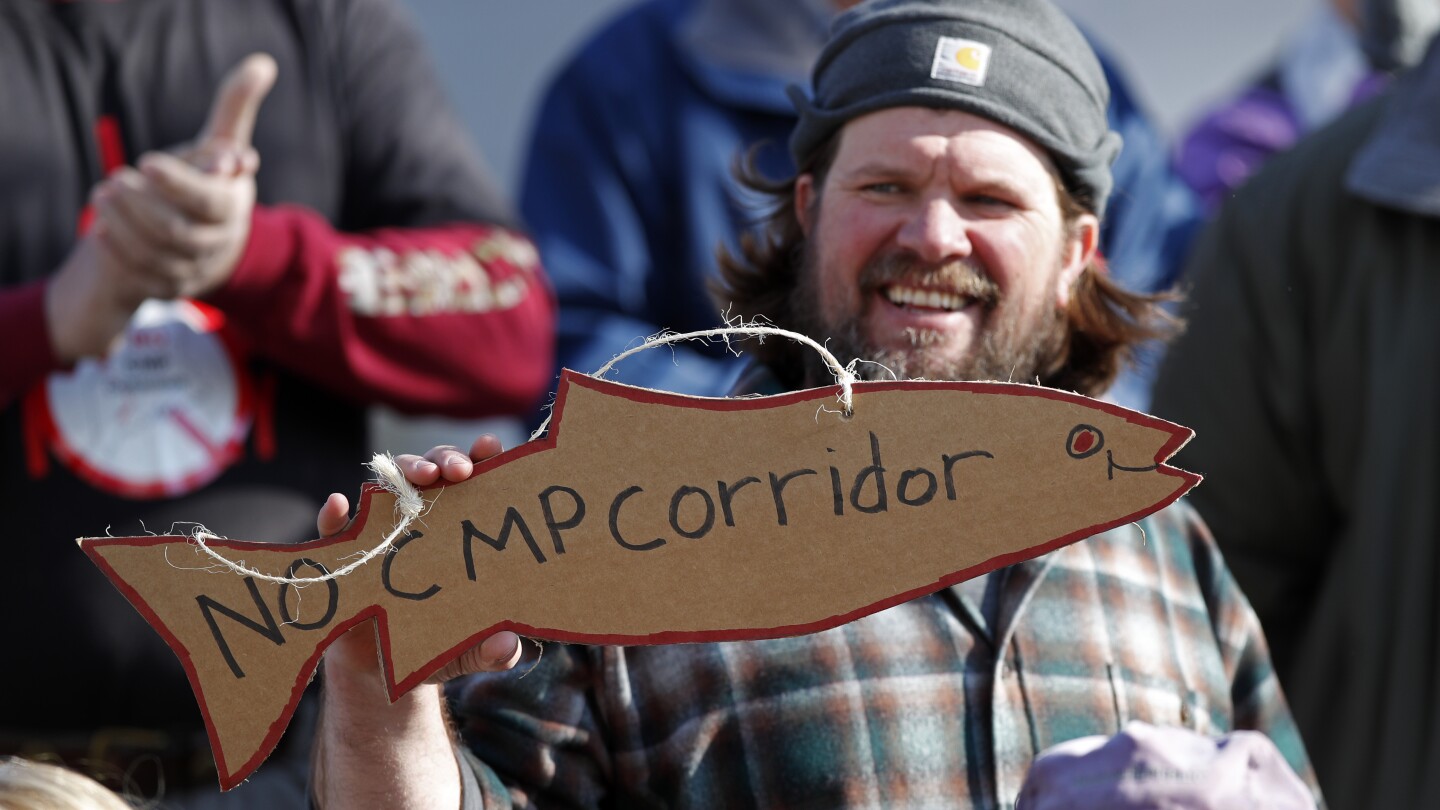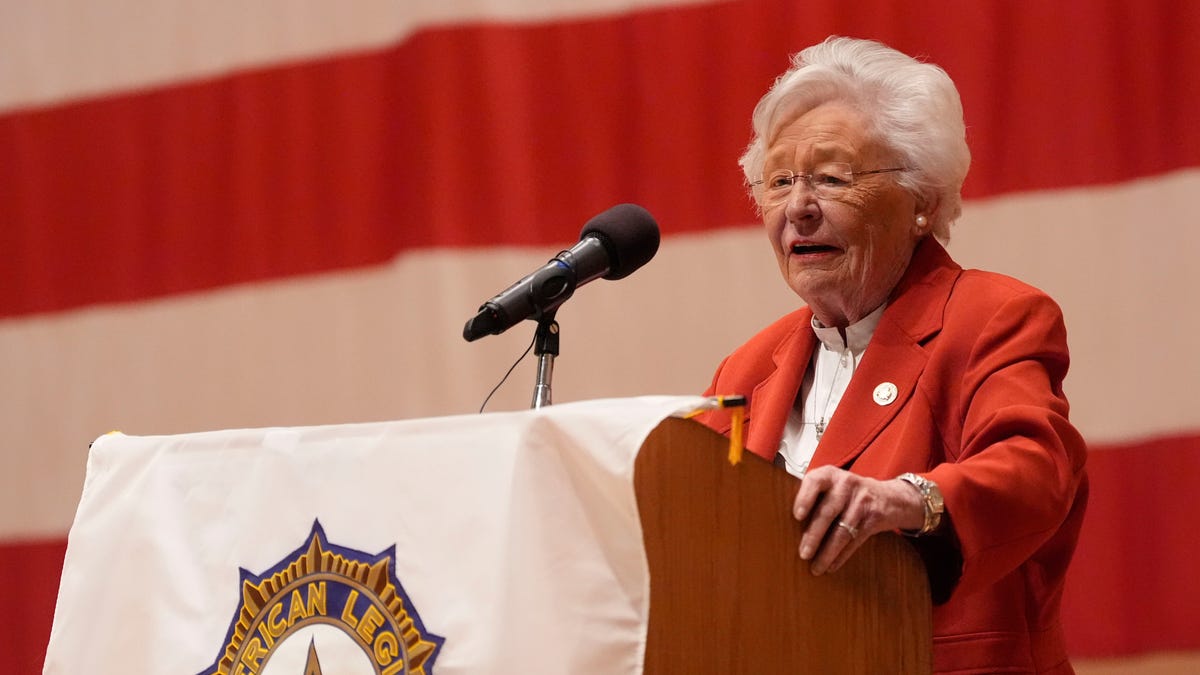Maine
Maine considers closing loophole that allows foreign government spending on referendums

PORTLAND, Maine (AP) — Maine voters are poised to decide whether to ban foreign influence in elections, many of them irked over the $22 million a Canadian utility spent to fight state referendums on a hydropower transmission project.
Hydro Quebec, owned by the Canadian province, exploited an election law loophole to fight attempts to stop the project on which the utility stood to gain $10 billion.
If voters grant their approval on Nov. 7, Maine would be the 10th state to close the loophole in federal election law that bans foreign entities from spending on candidate elections, yet allows donations for local and state ballot measures, said Aaron McKean, legal counsel for the nonprofit, nonpartisan Campaign Legal Center in Washington, D.C., which supports the Maine proposal.
Maine is the latest state to address foreign influence in elections.
A Minnesota election law approved this year includes a prohibition on donations from “foreign-influenced” entities in elections, while Florida and Idaho over the last three years have approved laws to prevent foreign influence on referendums, McKean said. Municipalities including Seattle and Portland, Maine, have adopted provisions, as well.
Daniel Weiner, a campaign finance expert at the Brennan Center for Justice, said the reality of foreign influence is that it’s generally more about dollars and cents than grand geopolitical strategy.
“It’s often not some nefarious spy master in the Kremlin,” Weiner said. “It’s a wealthy foreign corporation that has economic interest in the U.S. and wants to influence policy.”
Maine represents a prime example after Hydro Quebec spent eye-watering amounts of money on the most expensive referendum in state history focused on the utility’s cross-border transmission project with Central Maine Power. A Hydro Quebec spokesperson said the spending was necessary to counter attacks from “out-of-state oil and gas companies — or groups funded by them.” CMP, which contributed even more money, is owned by a Spanish utility that is not government owned.
Maine voters rebuked the $1 billion project in a referendum in 2021, but it was nonetheless allowed to move forward after a jury concluded that the referendum violated the developer’s constitutional rights.
Similar instances of foreign influence in elections have come up in other states.
In Montana, an Australian mining company’s Canadian subsidiary gave $18,000 to a political action committee and more than $270,000 to a mining association that funds the PAC in a 2018 referendum aimed at creating stricter environmental standards on hard rock mining. The referendum was defeated.
And in California, companies based in Luxembourg and Cyprus provided $325,000 to help defeat a 2012 Los Angeles initiative aimed at requiring actors in adult movies to use condoms, resulting in fines by the state’s campaign finance watchdog.
The Maine referendum on the Nov. 7 ballot would ban foreign governments, or companies with 5% or more foreign government ownership, from donating to future referendum races.
Republican state Sen. Rick Bennett, who led the campaign to put the proposal on the ballot, said there’s strong backing in Maine for banning all foreign governments — not just Canada and Hydro Quebec — from influencing referendums even though the proposal came up short in the Legislature following a veto by Democratic Gov. Janet Mills.
The governor cited concerns about the proposal’s constitutionality and said it was so broad it could silence “legitimate voices, including Maine-based businesses.” The Maine Press Association and Maine Association of Broadcasters also opposed the proposal, saying it would put them in a difficult position of vetting campaign ads to ensure compliance.
The Maine proposal is straightforward by targeting foreign governments and companies owned by them, while leaving untouched foreign-based corporations with no government ownership.
That means the ban on foreign spending would apply to Versant, Maine’s second-biggest electric utility, because it’s owned by Calgary, a city in Alberta, Canada. But the state’s largest electric utility, Central Maine Power, a subsidiary of Spanish utility Iberdrola, said it wouldn’t be subject to the provision. It said minority shareholders owned by foreign governments, Norway’s central bank Norges Bank and the government-owned Qatar Investment Authority, together fall below the 5% threshold. Also on the ballot is a separate referendum that would oust both investor-owned utilities and replace them with a nonprofit utility.
The idea of foreign influence in U.S. elections is something that unites people in an era of deep partisan divisions. “In a time of political polarization, it’s an issue where there’s bipartisan support,” said Sarah Walker, policy and legal advocacy director for the Ballot Initiative Strategy Center in Washington, D.C.
Bennett said concerns about foreign interference in elections were first voiced by George Washington, the nation’s first president. Closing the referendum loophole is a step states can take on their own without federal action, he said.
“It is a commonsensical thing,” he said. “Of course we shouldn’t have foreign governments meddling in our elections.”
___
Follow David Sharp on X, the platform formerly known as Twitter, @David_Sharp_AP

Maine
Gov. Mills and others kick off the beginning of Maine Dairy Month

OLD TOWN, Maine (WABI) – Governor Janet Mills proclaimed June as Maine Dairy Month. Today she, along with dairy farmers, students and others began the month with a milk toast at the University of Maine’s Witter Farm.
The gathering brought together dairy businesses, students and researchers at UMaine’s Witter Farm to celebrate and recognize the impact of the industry on the state of Maine.
Also stressing the importance of keeping the industry strong for generations to come.
“That’s vital,” answered UMaine President Joan Ferrini-Mundy. “We’ve got to be able to work through 4-H, we have some students here who are still in high school and all the way up through our graduate programs where we’re able to really understand how to modernize, improve efficiency and keeping that farming industry going.”
The 4-H program through U-Maine looks to teach young students about certain fields through hands-on education.
Mariah Johnson is a current 4-H member of Franklin County. She will be attending UMaine-Farmington in the fall on a pre-vet track.
“I’ve grown up on a farm my entire life so being around the animals and caring for the animals, I just want to be able to be one step ahead and be able to care for them on a deeper level,” commented Johnson.
Johnson says there really aren’t a lot of younger Mainers looking to make a career in the farming field and she sees it firsthand with 4-H.
“It’s very sad seeing that there isn’t as many kids going in as they’re coming out and I think that’s the same with the farm and America’s growing faster and the farms are decreasing and I really think we need to get that next generation into so that we can have a future for ag,” added Johnson.
Mills spoke at the ceremony. Praising the farm for it’s robotic milking system and stressing just how critical new ideas are for improving farming and holding on to the industry.
“Open space is part of our heritage, part of our economy, part of our sense of place here in Maine. So every kind of innovation that keeps this land open and in-use and productive is valuable to us and to generations to come,” said Mills.
Witter Farm and the robotic milking machine is open for tours. Click here for more information.
Copyright 2025 WABI. All rights reserved.
Maine
This Maine island home for sale comes with access to a rustic bowling alley

One of three summer cottages on a Maine island is for sale, and for the price of the home, you get shared access to a beach, tennis court, two docks and an old-fashioned bowling alley, too.
The property for sale is on Mouse Island, a mile south from Boothbay Harbor. It was listed Monday at $1.6 million, and has already attracted plenty of interest from out-of-state buyers, said listing agent Karen Roberts.
For decades, the 16-acre island was known as the home of The Samoset Hotel, which was built by a group of Skowhegan men in 1877 and could sleep 125 people, according to the Boothbay Register.
“People used to go by steamboat up from Boston to stay,” said Roberts, an agent with Tindal & Callahan Real Estate of Boothbay Harbor. “There’s some real history to the island itself.”
The hotel burned down in 1913. After that, the whole island was put up for sale and bought by private citizens including famous liberal Protestant minister Harry Emerson Fosdick, who used to write his sermons there, Roberts said.
“It is far enough from the mainland so that we can live an entirely unsophisticated life,” Fosdick once wrote of the island, according to the Wiscasset Newspaper. “That is to say; a man can put on a flannel shirt in the morning and go to bed in it at night if he feels like it.”
In 1924, three cottages were built on the island, according to the Register. A couple of the people who own those properties today are descended from those who built the cottages, but the owners of the one for sale were not, Roberts said.
The home for sale, which has not been winterized, presents a rare opportunity to own an island along with two other homeowners. All islanders share amenities including a rustic bowling alley built around the same time as the Samoset Hotel, Roberts said. A full-time caretaker lives on the island to maintain those amenities and ferry homeowners to Boothbay Harbor, she said.
Inside the home, there are five bedrooms, four bathrooms and features like a stone fireplace, warm wood interiors and a remodeled kitchen, according to its online listing. The island also includes walking trails, golf cart paths, and two solitary cabins which any of the owners can make use of.
Roberts’ phone has been ringing. She has been fielding questions from brokers representing out-of-state buyers charmed by the cottage’s history, location and amenities.
“It’s like going back in time. It’s just beautiful. But you’re a 15- to 20-minute boat ride from downtown Boothbay Harbor, so it’s very convenient and in a great location,” Roberts said. “You’re in your own little world out there.”
Maine
What to know about the dangers of climbing Mount Katahdin, Maine’s highest point – The Boston Globe

They were last seen at approximately 10:15 a.m. Sunday, setting off from Abol Campground towards the summit, Baxter State Park officials said.
Trail guides and experts have some pointers on how to prepare to climb Katahdin.
1. Don’t be fooled by numbers.
“People underestimate how challenging it is,” said Jesika Lucarelli, a Registered Maine Guide who’s been leading hikes up Katahdin since 2012. “People often look at a route and see it’s only 4.5 miles to the summit, but they don’t understand how rugged the terrain is.”
2. The terrain rises, trails scramble.
Mount Katahdin rises sharply from the northern wilderness. The trails scramble over steep, often slippery rock with limited visibility. “That’s why we say climb Katahdin and not hike it,” said Lucarelli.
Round-trip hikes average 8–12 hours, and all Katahdin trails are rated “moderate” to “extremely strenuous,” according to the Baxter State Park website.
3. The weather is tricky to predict.
The weather can change fast, especially in the “shoulder seasons” of late spring and early fall.
“The mountain is so high, it creates its own weather patterns,” said Tori Gray, a Registered Maine Guide and former Baxter State Park ranger. “Thunderstorms can roll in that weren’t even on the weather forecast. It happens very quickly, in a matter of minutes.”
Because conditions can change quickly, Noah Kleiner, a certified guide who leads hikes in summer and winter said he’s “always collecting data,” paying attention to both the environment and how his body is responding “in order to make the right decision.”
4. Think wilderness first, recreation second.
“It’s really rugged, it’s true wilderness, and sometimes that’s lost on people,” Gray said.
“Wilderness first, recreation second” is a guiding principle at Baxter State Park, Gray said. “The park promotes and stands by a primitive experience,” she said.
5. Avoid ‘summit fever’
The most important thing is knowing when to turn around. Gray said. “A lot of hikers are super experienced, but they have summit fever, they don’t care about anything but reaching the summit,” she said.
“But in a situation where you’re not feeling safe or comfortable on the mountain, say you see dark clouds or your ankle is starting to bother you, turn around.”
“The hike doesn’t end at the summit,” she said. “It ends in your car.”
“The mountain will always be there, it’s not going anywhere, whether I get to the summit today or tomorrow,” Kleiner said. ” And I think people forget that when they’re there. But you have to ask, what is the risk? And is it worth more than [reaching] the summit?”
Rita Chandler can be reached at rita.chandler@globe.com.
-

 News1 week ago
News1 week agoVideo: Faizan Zaki Wins Spelling Bee
-

 Politics7 days ago
Politics7 days agoMichelle Obama facing backlash over claim about women's reproductive health
-

 News1 week ago
News1 week agoVideo: Harvard Commencement Speaker Congratulates and Thanks Graduates
-

 Politics1 week ago
Politics1 week agoMusk officially steps down from DOGE after wrapping work streamlining government
-

 Technology1 week ago
Technology1 week agoAI could consume more power than Bitcoin by the end of 2025
-

 News1 week ago
News1 week agoPresident Trump pardons rapper NBA YoungBoy in flurry of clemency actions
-

 Technology1 week ago
Technology1 week agoSEC drops Binance lawsuit in yet another gift to crypto
-

 Technology1 week ago
Technology1 week agoOpenAI wants ChatGPT to be a ‘super assistant’ for every part of your life
















